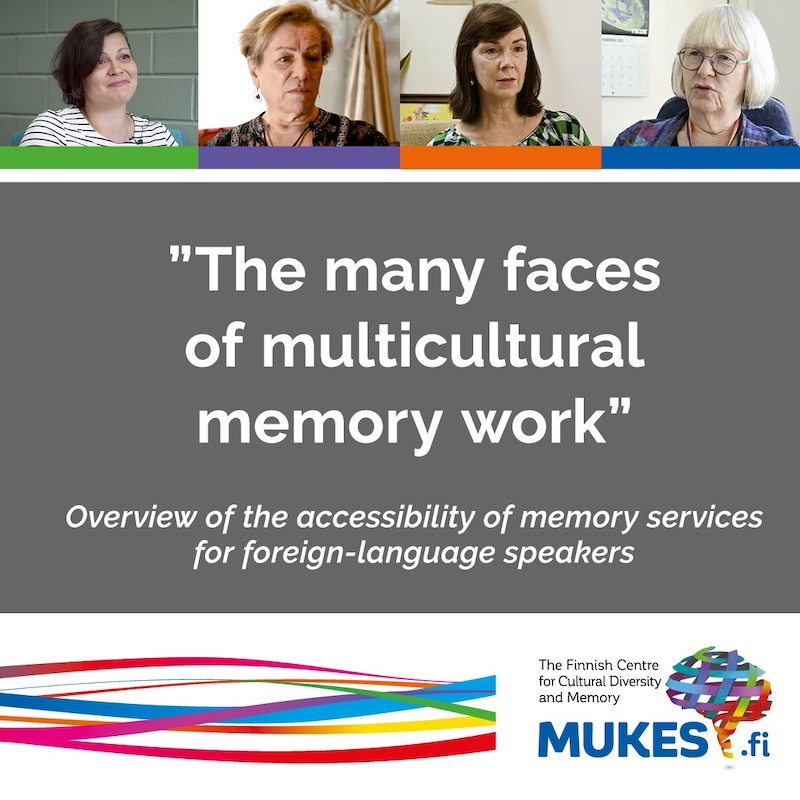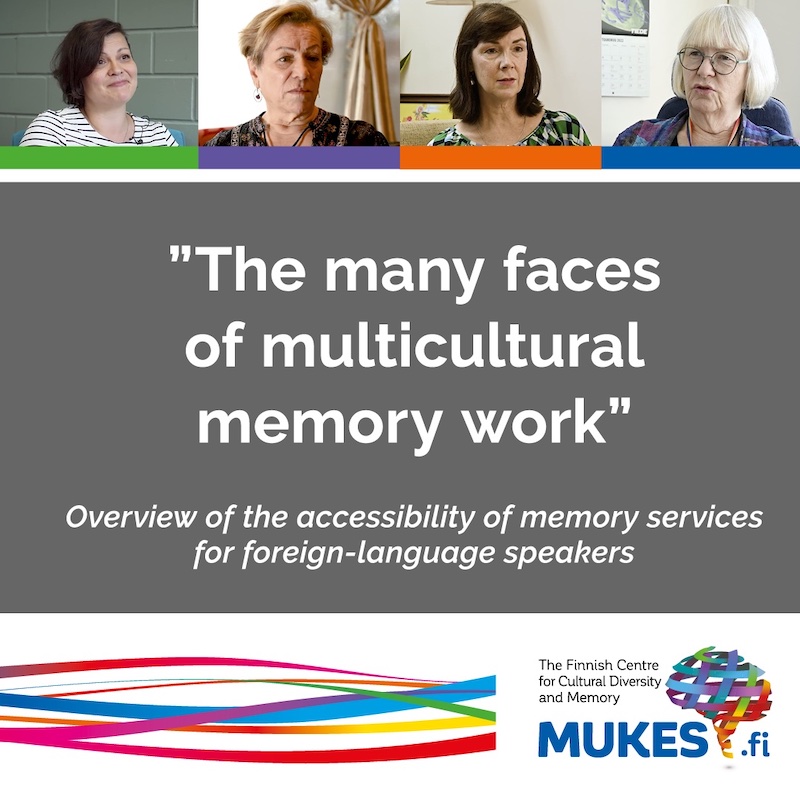MUKES development projects
2022 "The many faces of multicultural memory work” - video project
Click here to watch the MUKES video: ► "The many faces of multicultural memory work"
The video opens up perspectives on the memory service system challenges in Finland.
How could you influence so that foreign speakers could equally use memory services in your country?
Funded by The Foundation for Pluralism 
The Finnish Centre for Cultural Diversity and Memory published a video as a new tool at the end of 2022 "The many faces of multicultural memory work", which is aimed at future social security services development.
This video shows the views of different parties of memory work - looking at it from the perspective of a doctor, a person suffering from memory problems, a loved one, and a memory care provider. Although the video does not offer answers, it presents how linguistic and cultural minorities suffer from memory problems and how affected persons can survive in the current service system.
The video raises questions from the perspectives of both service users and providers: Are language skills enough? language and health literacy of clients belonging to cultural minorities in the service system for understanding and understanding memory disorders? What about whether the memory industry service providers have enough tools and know-how to meet linguistic and cultural minorities without losing their own professionalism?
The MUKES video was edited in English in 2023.
On February 2023 MUKES organized a discussion event, based on the video. The event discussed issues related to high-quality memory work and the right of all people to that - Everyone has the right to high-quality memory work. The quality of the services was examined with an emphasis on the human rights perspective because those needed by minorities services are also a human rights issue. Everyone has the right to receive treatment and help in a way that they understand the course and meaning of the treatment process as well as possible, and that he will be treated as himself.
We discussed with experts in the field how memory work should be developed so that the services offered would correspond to the needs and starting points of persons belonging to linguistic and cultural minorities. We pondered, what kind of understanding and know-how is needed for the quality of memory work done with minorities to improve.
Highlighted cultural otherness
The event was opened by University of Helsinki docent Anna-Leena Riitaoja by reflecting on the prevailing conditions, perceptions and practices that produce cultural otherness. The Finnish service system as a part the Nordic welfare model is by default universal, i.e. serving everyone. However, the services are built on the idea of a nation-state, making them suitable for certain types of people. As a result, those who swim like fish in water", are privileged to use services produced with public funds. "Norm's outsiders" come into contact with the structures and are ignored or excluded from the services. This leads to the fact that people seen as different are subject to change in the structures of the services instead of changing.
When users of the services are limited to certain types, they are divided into two groups: primary and secondary. The first ones include those who are, as it were, a priority and are considered the self-evident choice as users of the services. Those thought of as “others” are different and deviant, so their starting point and their needs are often ignored. This diminishes the value of people who are thought of as “others” and they are brought down “outside” to be managed by special services or organizations. In a diverse society, this kind of thing thinking is not sustainable from the point of view of social inclusion.
One argument for producing otherness is the appeal to cultural differences. Cultural differences overemphasizing instead of commonalities leads to the loss of common humanity. Equal need to use the services then remain unrecognized and the customer's goals begin to be set as their own based on interpretations. Those designated as culturally different are also often viewed "through one lens" and interpretations are often accompanied by negative preconceptions. The challenges faced by the customer are easily interpreted by cultural differences rather than the system. Frustration and criticism arising from the rigidity of the system are silenced by appealing to cultural differences.
From interpreting fears and inability to act as different
When we interpret those belonging to linguistic and cultural minorities as different, we often don't know how to speak up about sensitive topics. The situation may be related to the fear of hurting the elderly or causing a misunderstanding. However, avoiding public speaking does not serve the client, the professional, or society.
Elderly people who speak a foreign language have the right to receive information in an understandable way and in such a way that they also understand the service package and criteria for granting. If this is not received, we cannot assume that the elderly or their relatives know how to act in the right way in the service system or understand service paths.
Knowing how to do memory work with linguistic and cultural minorities also means paying attention to interpreter work. An interpreter's job is challenging in a situation where age, memory illness, and other factors combine interpretations of health. If the interpreter leaves something unsaid, explains more than the client spoke, or cannot verbalize difficult, taboo-related things, there is a risk that a memory work professional will not be able to get a true picture of the situation.
Future obligation by the law
Professionals of social and health services must remember that they are obliged by the law to advise and clarify. This obligation cannot be avoided by passing it on to presumed relatives or children.
Although the law does not oblige an adult to care for their loved ones, it is in many service processes a built-in assumption that a person has the help of someone close to them to achieve services. However, it should be remembered that there are also lonely people or people whose loved ones are not for one reason or another able to help. Relying on the help of loved ones can at worst lead to abuse or ill-treatment, especially for people with memory problems, whose language skills do not cover Finnish or Swedish, it can be difficult to tell others.
In finding out the memory situation and service needs, one should not make prior assumptions about the person, for example, based on his cultural background. Every person is an individual shaped by many things, who has individual needs and wishes. Professionals should practice self-reflection in what attitudes, with thoughts and values, he himself enters the service situation - is it what I personally consider good and desirable as life, a suitable model for that other person and how I value different choices through my own internal models.
Being heard and seen
There is often a lot of talk about dealing with a client with dementia. In another, to the topic of family care at the related event, Ruut Pylvänäinen, a trained experience expert in family care, has presented reflection on the meaning of meeting: Bears and wolves are met, birds and butterflies are heard and seen. This idea raises the question of whether there is always an additional element of tension in the encounter, which prevents us from being present in the situation completely calmly and with an open mind - especially when it's based on our own preconceived notions, we feel afraid that our skills are sufficient in the situation and we forget our actual professionalism.
Translation by: Anne Waweru
Takaisin

